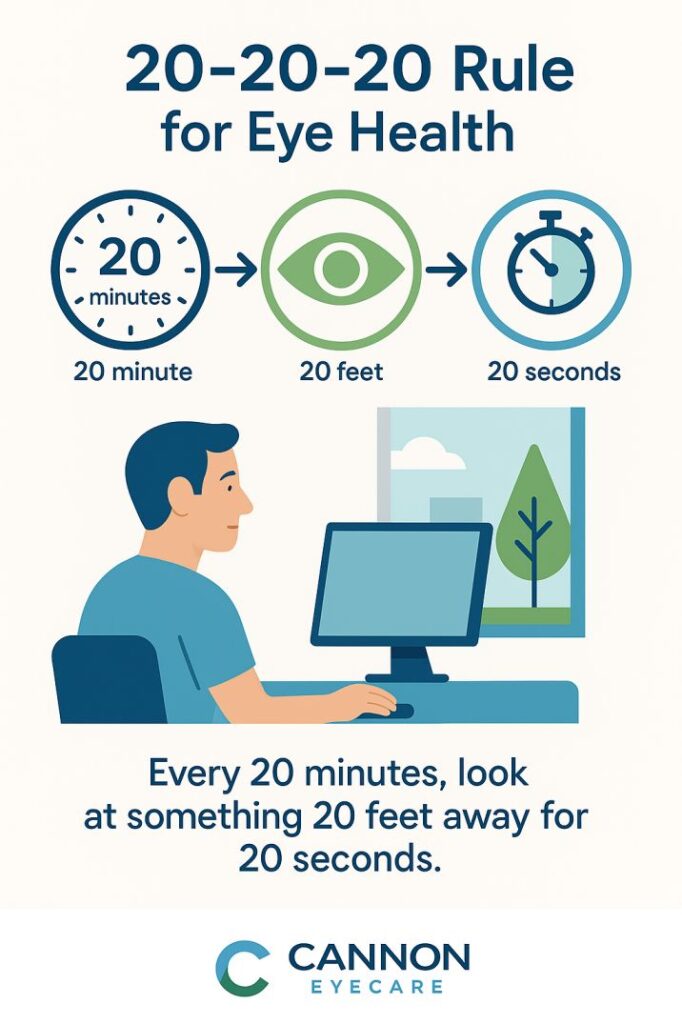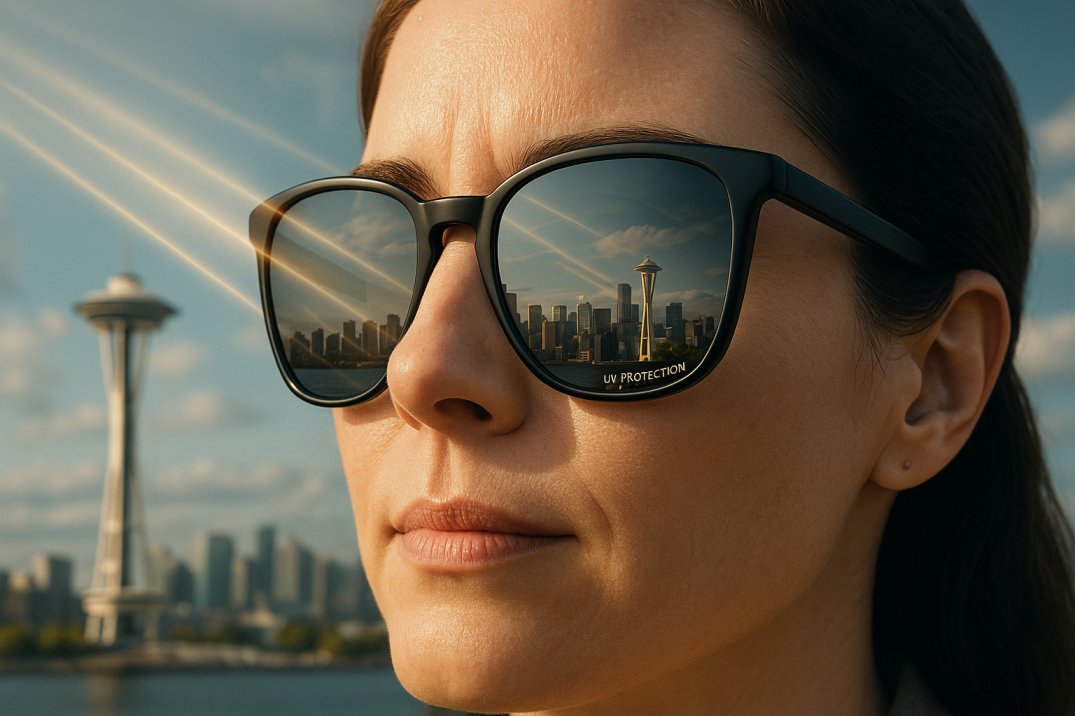Essential Lifestyle Practices for Eye Health: Complete 2025 Guide
Bottom Line Up Front: Simple daily lifestyle practices—from eating colorful vegetables and spending time outdoors to managing screen time and wearing UV protection—can dramatically reduce your risk of vision loss and keep your eyes healthy for life. Recent research shows that many eye health issues are preventable through proper lifestyle practices.
Quick Answer Box: What Are the Best Lifestyle Practices for Eye Health?
The most effective lifestyle practices for eye health include: eating nutrient-rich foods (especially leafy greens with lutein and zeaxanthin), following the 20-20-20 rule for screen use, exercising regularly, wearing UV-protective sunglasses, getting quality sleep, and scheduling regular comprehensive eye exams. These evidence-based practices can prevent many common eye diseases and preserve vision throughout your lifetime.
Introduction: Taking Control of Your Eye Health
Your daily choices have more impact on your vision than you might think. While genetics plays a role in eye health, many eye diseases don’t have any symptoms or warning signs, making lifestyle prevention your first line of defense. At Cannon EyeCare, we’ve seen countless patients preserve and improve their vision through simple, evidence-based lifestyle changes.
Whether you’re already experiencing symptoms like digital eye strain or want to prevent future problems, understanding how your daily habits affect your eyes empowers you to take meaningful action. This comprehensive guide combines the latest scientific research with practical advice you can implement immediately.
Nutrition: Fueling Your Eyes for Optimal Health
The Power of Eye-Healthy Nutrients
Your eyes require specific nutrients to function optimally and protect against age-related diseases. Consuming enough vitamins A, C, and E, minerals like zinc, and antioxidants like lutein and zeaxanthin may also boost your eye health.
Essential Eye Nutrients:
-
Lutein and Zeaxanthin: These powerful carotenoids act as natural sunglasses for your retina. Age-Related Eye Disease Study 2 found that a dosage of 10 mg of lutein and 2 mg of zeaxanthin per day was effective at reducing the progression to advanced AMD.
-
Omega-3 Fatty Acids: Critical for tear production and overall eye health. Research from 2023 shows that omega-3 supplements may benefit those with dry eye disease.
-
Vitamin C: This antioxidant supports blood vessel health in your eyes and helps regenerate other protective compounds.
-
Vitamin E: Works alongside lutein to protect retinal cells from oxidative damage.
-
Zinc: Essential for transporting vitamin A from your liver to your retina to produce protective melanin.
Best Foods for Eye Health
Dark Leafy Greens (Highest Priority):
- Spinach, kale, collard greens
- Swiss chard, arugula
- These provide the highest concentrations of lutein and zeaxanthin
Colorful Vegetables:
- Carrots, sweet potatoes (beta-carotene)
- Bell peppers, especially orange and yellow varieties
- Corn and peas
Healthy Fats and Proteins:
- Wild-caught salmon, tuna, sardines (omega-3s)
- Eggs, especially from pasture-raised chickens
- Nuts and seeds, particularly walnuts and flaxseeds
Fruits:
- Citrus fruits (vitamin C)
- Berries (antioxidants)
- Orange-colored fruits like cantaloupe and apricots
Mediterranean Diet: A Vision-Protecting Pattern
Diets such as those typified by Mediterranean or ‘Oriental-style’ foods have been shown to reduce the odds of developing AMD. This eating pattern emphasizes:
- High consumption of fruits and vegetables
- Regular fish intake (at least twice weekly)
- Healthy fats like olive oil
- Nuts and whole grains
- Limited processed foods
Lifestyle Habits That Protect Your Vision
Digital Screen Management: Protecting Your Eyes in the Digital Age
With screen-related eye strain affecting millions of Americans, proper digital habits are crucial for modern eye health. Digital eye strain symptoms include dry eyes, blurred vision, headaches, and neck pain.
The 20-20-20 Rule for Eye Health: Every 20 minutes, look at something 20 feet away for at least 20 seconds. This simple eye health practice, recommended by eye care professionals at Cannon EyeCare, helps relax the focusing muscles and reduce digital eye strain.
Additional Screen Strategies:
- Position screens 20-26 inches from your eyes
- Ensure the top of your screen is at or below eye level
- Use artificial tears to combat dry eyes
- Consider blue light filtering glasses for extended use
- Take longer breaks every 2 hours (15-minute breaks)
Physical Activity: Moving for Better Vision
Regular exercise benefits your eyes in multiple ways:
- Improved Blood Flow: Working out increases the amount of blood and nutrients that flow throughout your body, including to your eyes
- Reduced Disease Risk: Exercise helps prevent diabetes, high blood pressure, and other conditions that can damage your vision
- Weight Management: Research shows that extra pounds can lead to inflammation throughout your body. That can result in eye issues such as cataracts, macular degeneration, and glaucoma
Recommended Activity Level: Aim for 150 minutes of moderate exercise weekly, as recommended by health experts. This could include:
- Brisk walking
- Swimming
- Cycling
- Yoga or stretching
- Strength training
Sleep and Eye Health
Quality sleep is essential for eye health and recovery. During sleep, your eyes:
- Clear out metabolic waste
- Repair daily damage
- Restore tear production
- Reduce inflammation
Sleep Recommendations:
- Aim for 7-9 hours nightly
- Maintain consistent sleep/wake times
- Create a dark, cool sleeping environment
- Limit screen exposure 1-2 hours before bed
Stress Management
Chronic stress can impact your vision through:
- Increased inflammation
- Elevated cortisol levels affect tear production
- Tension headaches that strain the eyes
- Poor sleep quality
Stress-Reduction Techniques:
- Regular meditation or mindfulness practice
- Deep breathing exercises
- Regular physical activity
- Time in nature
- Social connections and support
Environmental Protection Strategies
UV Protection: Your Eyes’ Sunscreen
The right pair of shades will help protect your eyes from the sun’s ultraviolet (UV) rays. Too much sun can increase your chances of cataracts and macular degeneration.
Choosing Effective Sunglasses:
- Look for 99-100% UVA and UVB protection
- Consider wraparound styles for maximum coverage
- Polarized lenses reduce glare
- Wear sunglasses year-round, even on cloudy days
Indoor Air Quality
Poor air quality can irritate your eyes and exacerbate dry eye symptoms:
- Use air purifiers with HEPA filters
- Maintain proper humidity levels (30-50%)
- Avoid direct airflow from vents or fans
- Consider a humidifier in dry environments
Outdoor Time: Natural Eye Protection
Epidemiological and interventional research has consistently revealed a compelling connection between increased outdoor time and a decreased risk of myopia in children. While this research focuses on children, adults also benefit from:
- Natural light exposure (with proper UV protection)
- Distance vision opportunities
- Reduced near-work stress
- Fresh air and reduced pollutants
Recent Scientific Breakthroughs in Eye Health
Myopia Prevention Research
This surge in myopia rates, occurring within a relatively stable genetic framework, underscores the profound influence of environmental and lifestyle factors on this condition. A landmark 2024 study published in the Journal of Physiological Anthropology revealed that:
- Time spent outdoors significantly reduces myopia risk
- Natural light exposure promotes healthy eye development
- Environmental factors outweigh genetic predisposition in many cases
Blue Light and Digital Strain Studies
Recent research has clarified the relationship between blue light exposure and eye health:
- Human eyes aren’t great at blocking it out. Over time, blue light may start to damage cells inside your eyes and raise your risk for conditions such as macular degeneration and cataracts
- The intensity from digital devices is generally below harmful levels
- Eye strain symptoms are more related to reduced blinking and prolonged focusing
Nutrition Research Updates
A 2024 clinical trial investigating lutein and zeaxanthin supplementation in digital device users showed:
- Previous clinical studies have demonstrated the benefits of daily supplementation with macular xanthophylls for improving MPOD and visual performance
- Young adults with high screen exposure showed improved visual contrast
- Combination supplementation with omega-3 fatty acids enhanced benefits
Building Your Eye Health Plan
Daily Habits Checklist
Morning:
- Take eye supplements (if recommended by your eye doctor)
- Eat a nutrient-rich breakfast with eye-healthy foods
- Apply UV protection before going outside
Throughout the Day:
- Practice the 20-20-20 rule during screen work
- Stay hydrated (8-10 glasses of water)
- Take regular movement breaks
- Wear appropriate eye protection for activities
Evening:
- Remove contact lenses promptly
- Use preservative-free artificial tears if needed
- Limit blue light exposure 1-2 hours before bed
- Practice stress-reduction techniques
When to Seek Professional Care
While lifestyle practices are crucial, regular professional eye exams remain essential. Contact an eye care professional if you experience:
- Sudden vision changes
- Persistent eye pain or discomfort
- Frequent headaches
- Difficulty seeing at night
- New floaters or flashes of light
- Any concerns about your vision
Recommended Exam Schedule:
- Ages 18-39: Every 2-3 years
- Ages 40-54: Every 2 years
- Ages 55-64: Every 1-2 years
- Ages 65+: Annually
Customizing Your Approach
Your lifestyle plan should reflect your unique circumstances:
For Office Workers:
- Prioritize screen break strategies
- Ensure proper workspace lighting
- Consider computer glasses
- Schedule regular outdoor breaks
For Outdoor Workers:
- Emphasize UV protection
- Use wraparound safety glasses
- Stay hydrated in all weather
- Regular eye exams to monitor UV damage
For Parents:
- Model healthy eye habits for children
- Limit family screen time
- Encourage outdoor activities
- Schedule comprehensive family eye exams
Long-term Vision Health Strategy
Creating Sustainable Habits
The most effective eye health strategies are those you can maintain long-term:
- Start Small: Choose 1-2 habits to implement consistently before adding more
- Track Progress: Use a simple journal or app to monitor your habits
- Be Consistent: Regular small actions outperform sporadic large efforts
- Adjust as Needed: Modify your approach based on what works for your lifestyle
Prevention vs. Treatment
While treatment options continue to advance, prevention remains more effective and affordable:
- Lifestyle interventions cost significantly less than treating advanced eye diseases
- Many vision problems are irreversible, making prevention crucial
- Early habits established in adulthood protect vision for decades
Three key resources that supported the evidence-based recommendations
1. Environmental and Lifestyle Factors in Myopia Development
Source: Biswas, S., El Kareh, A., Qureshi, M. et al. “The influence of the environment and lifestyle on myopia.” Journal of Physiological Anthropology 43, 7 (2024).
Link: https://jphysiolanthropol.biomedcentral.com/articles/10.1186/s40101-024-00354-7
Key Finding: This comprehensive 2024 review demonstrates that environmental and lifestyle factors significantly outweigh genetic predisposition in myopia development, with outdoor time and reduced near work being the most protective factors.
2. National Eye Health Guidelines and Prevention
Source: National Eye Institute. “Keep Your Eyes Healthy: Evidence-Based Prevention Guidelines”
Link: https://www.nei.nih.gov/learn-about-eye-health/healthy-vision/keep-your-eyes-healthy
Key Finding: Authoritative guidelines confirm that healthy lifestyle habits like proper nutrition, physical activity, and UV protection can significantly reduce the risk of eye diseases and vision problems.
3. Lutein and Zeaxanthin Research for Digital Device Users
Source: Ma, L., et al. “Effect of supplementation with lutein, zeaxanthin, and omega-3 fatty acids on macular pigment and visual function in young adults with long-term use of digital devices.” Frontiers in Nutrition (2024).
Link: https://www.frontiersin.org/journals/nutrition/articles/10.3389/fnut.2024.1422468/full
Key Finding: Recent clinical trial evidence shows that targeted supplementation can improve visual function and macular protection in adults with high digital device exposure.
Note: Additional research from the American Optometric Association, WebMD, Mayo Clinic, and other medical institutions also informed the nutritional and lifestyle recommendations presented in this article.
Conclusion: Transform Your Eye Health with Simple Lifestyle Practices
The power to protect and enhance your eye health lies largely in your daily lifestyle choices. From the nutritious foods you eat to the time you spend outdoors, each decision contributes to your long-term vision health. The research is clear: comprehensive lifestyle practices for eye health can prevent many vision problems when combined with regular professional eye care.
Key Takeaways for Better Eye Health:
- Eat a variety of colorful, nutrient-rich foods daily
- Practice the 20-20-20 rule during screen time
- Exercise regularly and maintain a healthy weight
- Protect your eyes from UV radiation with quality sunglasses
- Get adequate sleep and manage stress effectively
- Schedule regular comprehensive eye exams
At Cannon EyeCare, we partner with our patients to develop personalized eye health strategies that fit their lives. Remember, these lifestyle practices work best when combined with regular professional eye care. Your vision is irreplaceable—invest in protecting it today.
Ready to take the next step in your eye health journey? Contact Cannon EyeCare to schedule your comprehensive eye exam and discuss your personalized eye health plan. Our experienced team will help you understand your unique risk factors and create a lifestyle strategy that protects your vision for years to come.
Call us today or visit our convenient locations in University Village and Pike Place Market to begin your journey toward optimal eye health.
FAQs
-
-
Eat leafy greens and colorful veggies.
-
Follow the 20-20-20 rule for screen time.
-
Get regular exercise.
-
Wear UV-protective sunglasses.
-
Schedule yearly eye exams
-




